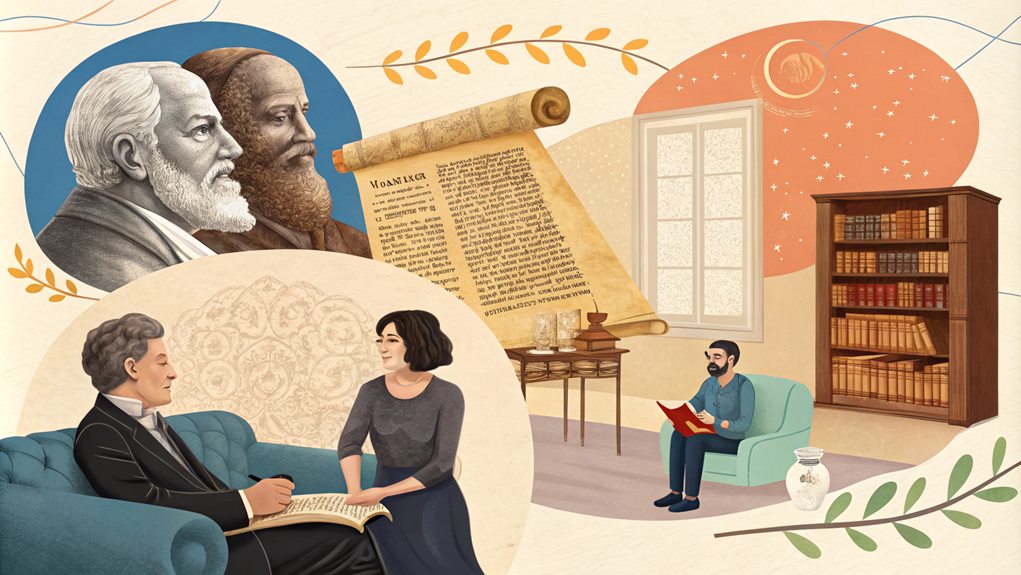
Did you know that nearly 80% of today's therapeutic practices can trace their roots back over two millennia? As you consider the evolution of psychotherapy, it becomes evident that its foundations are deeply embedded in ancient healing traditions, philosophical inquiries, and religious narratives. Each layer of this complex history reveals not only an understanding of mental health but also an exploration of the human experience. What might surprise you is how these early influences continue to shape modern approaches, prompting us to question the very essence of healing and connection.
Ancient Civilizations and Healing

Healing has always been a fundamental aspect of human existence, deeply intertwined with our quest for understanding the mind and body. In ancient civilizations, you'll find a rich tapestry of practices aimed at restoring balance and promoting mental well-being. These cultures recognized that the mind and body aren't separate entities; they believed that physical ailments often stemmed from emotional or spiritual disturbances. Early forms of cognitive rehabilitation, akin to modern methods, were employed to address these issues, emphasizing the importance of holistic approaches in treatment therapeutic interventions.
As you explore these ancient healing methods, consider how shamans, priests, and healers employed rituals, herbs, and storytelling to foster psychological and physical healing. You might notice how these practices reflect a holistic understanding of health, where community, spirituality, and nature played vital roles. The connection between the individual and the collective emphasized that healing isn't merely a personal journey; it's a shared experience.
Greek Philosophical Traditions
As ancient civilizations laid the groundwork for understanding mental well-being, Greek philosophical traditions emerged as pivotal in shaping the discourse around the mind's complexities. You'll find that philosophers like Socrates, Plato, and Aristotle didn't just contemplate existence; they explored the nature of the self and the psyche. Socrates emphasized self-examination, urging you to reflect on your thoughts and beliefs to achieve personal insight. This introspection laid a foundation for what would become therapeutic practices. Research in cognitive psychology shows that understanding mental processes can enhance these therapeutic approaches.
Plato, on the other hand, introduced the concept of the tripartite soul, suggesting that harmony among reason, spirit, and appetite leads to mental well-being. This idea prompts you to think about how your internal conflicts can impact your overall state. Aristotle further advanced this by linking virtues to happiness, indicating that cultivating moral character directly influences mental health.
These philosophical frameworks invite you to explore the interconnectedness of thought, emotion, and behavior. They challenge you to reflect on your own experiences and beliefs, demonstrating that understanding the mind's complexities is not merely an academic exercise but a path toward greater self-awareness and emotional resilience. In this way, these traditions laid the groundwork for modern psychotherapy.
The Role of Religion

Religion has long played a significant role in shaping our understanding of the mind and its well-being. It influences how you perceive mental distress and offers frameworks for coping mechanisms. By examining the intersections of faith and psychology, you can see how religious beliefs often provide essential support in times of emotional turmoil, much like the role of cognitive dissonance in maneuvering conflicting beliefs and emotions.
Consider these four key aspects of religion's role in mental health:
- Meaning and Purpose: Religious narratives can help you find meaning in suffering, offering solace and a greater context for personal struggles.
- Community Support: Faith-based communities create networks of support, allowing members to share their burdens and experiences, fostering a sense of belonging.
- Rituals and Practices: Engaging in religious rituals can serve as therapeutic practices, promoting mindfulness and emotional release.
- Moral Framework: Religious teachings often provide ethical guidelines that can help you navigate life's challenges, creating a sense of order and direction.
Ultimately, religion can serve as a powerful ally in understanding your mental health, shaping your beliefs, and influencing your healing journey. The blend of spirituality and psychology continues to evolve, revealing deeper insights into the human experience.
Early Medical Practices
When you consider early medical practices, you can't help but recognize how ancient healing traditions laid the groundwork for understanding mental health. Asylums emerged as both a refuge and a means of control, reflecting society's struggle to care for those deemed 'different.' The influence of Hippocrates, with his emphasis on observation and holistic treatment, invites you to rethink how these early approaches shaped the evolution of psychotherapy. These historical practices echo the importance of tailored therapies in modern contexts, similar to the way cognitive rehabilitation focuses on improving cognitive functions post-injury or illness. Understanding these roots can enhance our appreciation for the complexity of mental health treatment today.
Ancient Healing Traditions
Ancient healing traditions laid the groundwork for what we now recognize as psychotherapy, intertwining physical and mental well-being in ways that were often inseparable. You might find it fascinating to explore how these early practices shaped our understanding of the mind-body connection. Healers of the past viewed emotional and psychological disturbances as manifestations of physical ailments or spiritual imbalances, emphasizing a holistic approach.
Consider these four key elements that exemplify ancient healing traditions:
- Rituals and Ceremonies: Engaging in community rituals fostered social support, alleviating feelings of isolation.
- Herbal Remedies: Natural substances were used not just for physical ailments but also to soothe emotional distress, highlighting nature's role in healing.
- Meditation and Mindfulness: Practices aimed at achieving mental clarity and emotional balance can be traced back thousands of years, showing early recognition of mental health's importance.
- Storytelling and Myths: Narratives served as therapeutic tools, allowing individuals to process experiences and emotions within a cultural context.
These traditions reveal an enduring understanding of the interconnectedness of mind, body, and spirit, setting the stage for contemporary psychotherapy.
Asylums and Mental Care
As societies evolved, so did the approach to mental health care, leading to the establishment of asylums and early medical practices specifically designed for individuals experiencing psychological distress. These institutions emerged from a growing recognition that mental health issues required dedicated spaces and structured care. You might find it interesting that while some asylums aimed to provide refuge, they often became places of confinement, reflecting society's struggle to understand and treat mental illness.
In these early days, treatment methods ranged from the compassionate to the cruel. On one hand, you'd see the implementation of moral treatment, emphasizing kindness and rehabilitation. On the other hand, practices like bloodletting and isolation were common, revealing a profound misunderstanding of mental illness. This dichotomy raises questions about the ethical implications of care—was it truly therapeutic, or merely a means of control?
As you explore this historical context, consider how these early practices laid the groundwork for contemporary mental health approaches. The legacy of asylums, despite their flaws, highlights an evolving awareness that psychological well-being is integral to human experience, prompting ongoing dialogue about the nature of care and compassion in mental health treatment.
Hippocratic Influence on Therapy
The Hippocratic influence on early medical practices greatly shaped the foundations of psychotherapy, marking a pivotal shift in how mental health was perceived and treated. You can trace the roots of therapeutic methods back to the holistic approach Hippocrates championed, which emphasized the interplay between body and mind. This perspective paved the way for a more humane treatment of mental illness, steering away from superstition and toward a systematic understanding of psychological well-being.
Consider these key elements of the Hippocratic approach:
- Natural Causes: Hippocrates believed that mental health issues stemmed from natural, not supernatural, causes, prompting a search for physical explanations.
- Observation and Diagnosis: He advocated for careful observation of patients, emphasizing an individualized approach to diagnosis and treatment.
- Ethical Standards: The Hippocratic Oath laid the groundwork for ethical practice in medicine, promoting compassion and integrity in patient care.
- Holistic Treatment: He encouraged a thorough view of health, integrating diet, environment, and lifestyle into therapeutic practices.
The Renaissance and Humanism

During the Renaissance, a profound shift occurred in how individuals viewed themselves and their place in the world, marking the emergence of humanism as a pivotal philosophical movement. You're likely aware that this period emphasized the value of human experience, reason, and individuality. This focus encouraged you to explore the intricacies of your own psyche, laying the groundwork for future therapeutic practices.
Humanism challenged the prevailing medieval worldview, which often prioritized divine authority over personal insight. By championing the notion that you possess the inherent capacity for self-knowledge, humanists like Erasmus and Pico della Mirandola inspired a deeper introspection. You began to view emotional struggles not as mere moral failings but as complex human experiences worthy of exploration.
This shift in perspective opened new avenues for understanding mental health, as the emphasis on self-actualization and personal growth became integral to your narrative. The Renaissance's exploration of human potential directly influenced early therapeutic frameworks, paving the way for a more compassionate approach to human suffering. As you reflect on this transformation, consider how these ideas laid the foundation for the therapeutic practices that would emerge in subsequent centuries.
The Birth of Modern Psychology
A pivotal moment in the evolution of thought, the birth of modern psychology emerged in the late 19th century, marking a significant departure from the philosophical musings of earlier centuries. You might wonder how this shift influenced the way we comprehend the human mind today. This period laid the groundwork for a more empirical approach, focusing on observable behavior rather than abstract speculation.
Consider the following aspects that define this transformation:
- Scientific Method: Psychologists began to apply rigorous scientific methods to study behavior and mental processes.
- Experimental Psychology: The establishment of laboratories, such as Wilhelm Wundt's in 1879, emphasized controlled experimentation.
- Behaviorism Emergence: Figures like John B. Watson shifted the focus from introspection to observable behavior, challenging the subjective nature of earlier psychology.
- Psychological Theories: Theories began to emerge that sought to explain mental processes in a systematic way, leading to various schools of thought.
In this context, the birth of modern psychology not only redefined the discipline but also prompted deeper inquiries into what it means to be human, shaping future therapeutic practices.
Influential Figures in Psychotherapy

As you explore the landscape of psychotherapy, consider how Sigmund Freud's pioneering concepts shaped our understanding of the unconscious. Then, reflect on Carl Rogers' humanistic approach, which shifted the focus toward the individual's potential for growth and self-actualization. These influential figures not only transformed therapeutic practices but also invited you to examine your own beliefs about healing and personal development.
Sigmund Freud's Contributions
Few figures have shaped the landscape of psychotherapy as significantly as Sigmund Freud. His insights into the human psyche have fundamentally altered how we perceive mental health. Freud's contributions extend beyond mere theory; they invite you to explore the depths of your unconscious mind and recognize the complexities of human behavior.
You can appreciate Freud's impact by considering these key elements:
- Psychoanalysis: Freud introduced this therapeutic technique, emphasizing the importance of unconscious thoughts and childhood experiences.
- Defense Mechanisms: He identified various ways individuals protect themselves from anxiety, such as repression and projection, enhancing your comprehension of emotional responses.
- Dream Analysis: Freud's work on dreams as a pathway to the unconscious provides a framework for interpreting personal symbolism and hidden desires.
- Psychosexual Development: His theory of stages of development outlines how early experiences shape personality, prompting you to reflect on your own formative years.
Freud's contributions challenge you to confront the intricacies of your mind, urging an introspective journey where healing and growth can occur through understanding the past and its influence on the present.
Carl Rogers' Humanistic Approach
Carl Rogers revolutionized psychotherapy with his humanistic approach, which emphasizes the inherent potential for growth within each individual. This perspective shifts the focus from pathology to the client's agency. You might find it compelling how Rogers believed that people possess an intrinsic drive toward self-actualization. This means that, given the right environment, you can tap into your capabilities and achieve personal fulfillment.
Central to Rogers' theory is the concept of unconditional positive regard. He posited that when you feel accepted and valued without conditions, it fosters an atmosphere conducive to growth. Through this lens, you can explore your thoughts and feelings more freely, leading to deeper self-understanding.
Rogers also introduced the importance of empathy in the therapeutic relationship. By genuinely understanding your experience, the therapist can help you navigate your emotional landscape more effectively. This empathetic connection creates a safe space for vulnerability, prompting deeper insights and healing.
In embracing Rogers' humanistic approach, you likely recognize the transformative power of self-exploration. This journey isn't just about addressing issues; it's about uncovering the layers of your potential and fostering a more authentic self.
Psychoanalysis and Its Impact
Psychoanalysis, often viewed as a revolutionary framework in understanding the human psyche, has profoundly shaped therapeutic practices and our perception of mental health. It invites you to explore the intricate layers of the mind, emphasizing the importance of unconscious processes. By delving into these hidden domains, you can uncover the roots of emotional conflict and dysfunctional behavior.
Consider how psychoanalysis has influenced modern therapy in these key ways:
- Exploration of the Unconscious: You learn that much of your behavior is driven by unconscious thoughts and feelings, prompting deeper self-reflection.
- Importance of Childhood Experiences: Recognizing that early life events shape adult behavior allows you to reframe personal narratives and address unresolved conflicts.
- Therapeutic Relationship: The emphasis on transference and countertransference highlights the relational dynamics between therapist and client, fostering a deeper understanding of interpersonal patterns.
- Defense Mechanisms: Identifying your defense mechanisms can lead to greater self-awareness and emotional growth.
Through these insights, psychoanalysis not only revolutionizes therapy but also enriches your understanding of human behavior, ultimately guiding you toward healing and self-discovery.
Evolution of Psychotherapeutic Techniques

As you navigate the landscape of psychotherapy, you'll notice that techniques have evolved considerably over the decades, adapting to the changing needs of individuals and society. Early methods like psychoanalysis focused on uncovering unconscious conflicts, but as the understanding of human behavior expanded, so did the approaches. Cognitive-behavioral therapy (CBT) emerged, emphasizing the role of thoughts in shaping emotions and actions. You might find this shift significant, as it reflects a growing acknowledgment of how practical, structured techniques can facilitate change.
In recent years, mindfulness-based therapies have gained traction, integrating ancient practices into modern psychological frameworks. This evolution reveals a broader trend: therapists are increasingly considering the holistic nature of mental health, incorporating emotional, physical, and spiritual dimensions.
Additionally, the rise of technology has transformed therapeutic techniques, with online sessions and apps providing new avenues for support. You may ponder how these advancements challenge traditional methodologies, pushing the boundaries of what therapy can be.
Ultimately, the evolution of psychotherapeutic techniques highlights an ongoing dialogue between theory and practice, inviting you to reflect on what resonates most with your understanding of mental well-being.
Read The Next Blog Post –
As you reflect on the roots of psychotherapy, consider how ancient healers, much like modern-day therapists, sought to mend the soul's fabric. Just as Socrates urged self-examination, today's practices invite you to explore your inner landscape. The journey from the mystical to the scientific underscores a timeless quest for understanding and healing. Like a phoenix rising from the ashes, psychotherapy continues to evolve, reminding you that the quest for mental wellness is both an art and a science.














